2024年冀教版中考英语语法复习时间状语从句 课件(共17张PPT)
文档属性
| 名称 | 2024年冀教版中考英语语法复习时间状语从句 课件(共17张PPT) | 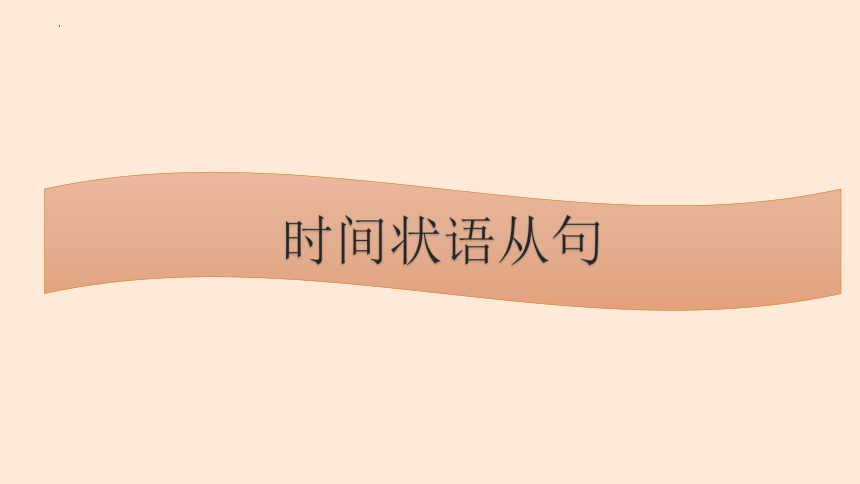 | |
| 格式 | pptx | ||
| 文件大小 | 2.5MB | ||
| 资源类型 | 教案 | ||
| 版本资源 | 冀教版 | ||
| 科目 | 英语 | ||
| 更新时间 | 2024-05-10 14:25:29 | ||
图片预览

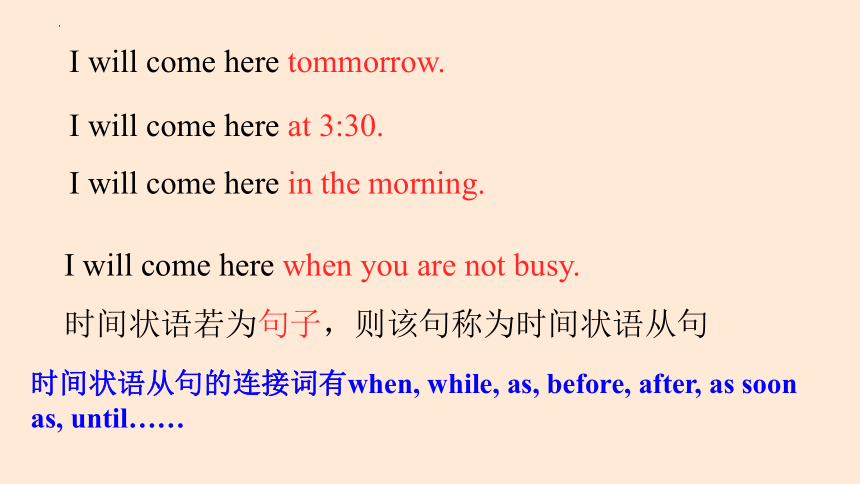
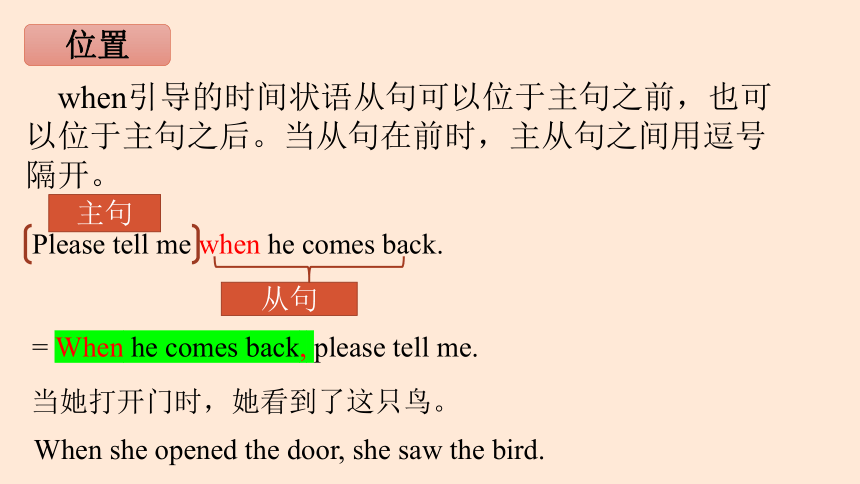
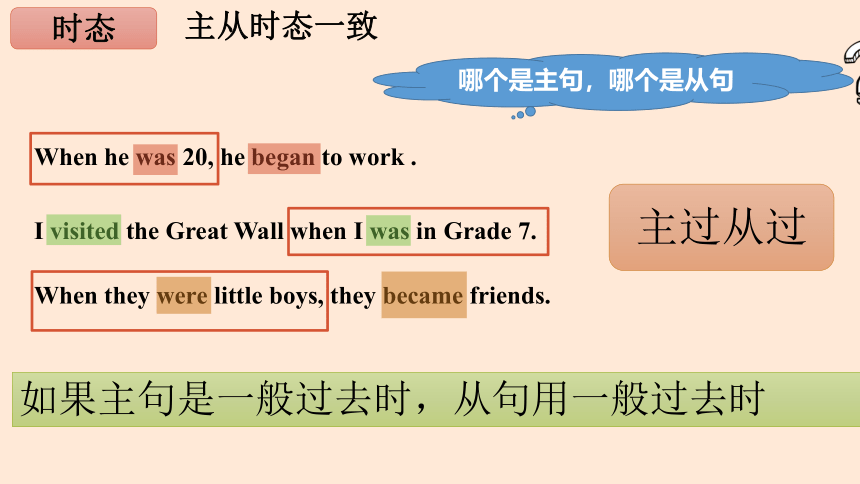
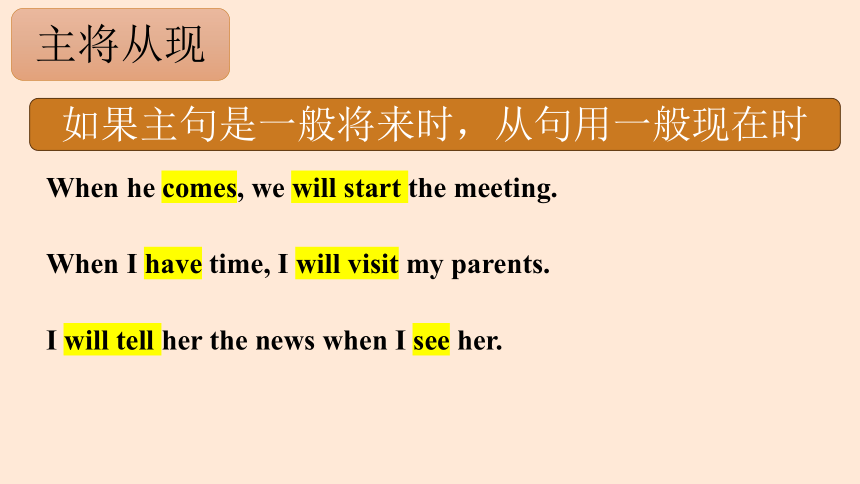
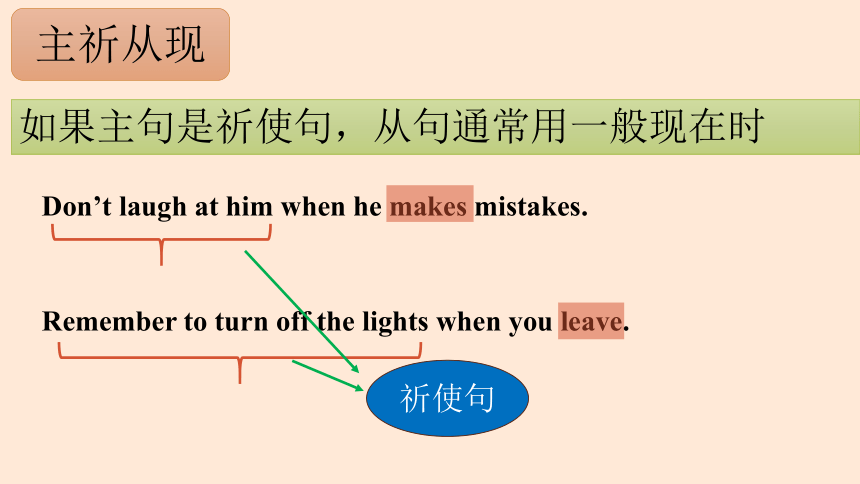
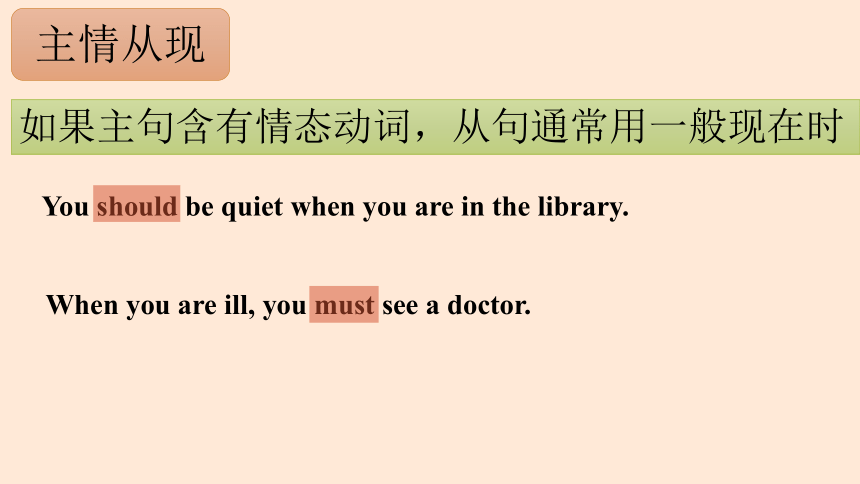
文档简介
(共17张PPT)
时间状语从句
I will come here tommorrow.
I will come here at 3:30.
I will come here in the morning.
I will come here when you are not busy.
时间状语若为句子,则该句称为时间状语从句
时间状语从句的连接词有when, while, as, before, after, as soon as, until……
when引导的时间状语从句可以位于主句之前,也可以位于主句之后。当从句在前时,主从句之间用逗号隔开。
位置
Please tell me when he comes back.
= When he comes back, please tell me.
当她打开门时,她看到了这只鸟。
主句
从句
When she opened the door, she saw the bird.
时态
主从时态一致
When he was 20, he began to work .
I visited the Great Wall when I was in Grade 7.
When they were little boys, they became friends.
哪个是主句,哪个是从句
主过从过
如果主句是一般过去时,从句用一般过去时
When he comes, we will start the meeting.
主将从现
如果主句是一般将来时,从句用一般现在时
When I have time, I will visit my parents.
I will tell her the news when I see her.
主祈从现
如果主句是祈使句,从句通常用一般现在时
Don’t laugh at him when he makes mistakes.
Remember to turn off the lights when you leave.
祈使句
主情从现
如果主句含有情态动词,从句通常用一般现在时
You should be quiet when you are in the library.
When you are ill, you must see a doctor.
while用法:
1. while引导的动作必须是持续性的或进行中的,在……期间,往往指一段时间
While we were talking, he came in.
Please don’t talk so loud while others are working.
2. while作为并列连词,意为“而,却”,侧重主句动作和从句动作相对比。
We are cleaning the classroom while they are playing the football.
as 用法:
as引导的时间状语从句, 可以表达“正当……”, “一 边……一边……”,“随着……”等意思。
As the sun rose, the fog disappeared.
as表示“随着…”,常指一个行为是另一个行为的结果,或一种状态随另一种状态变化。句中的动词多表示状态的发展变化。
As she grew older, she became more beautiful.
before引导的时间状语从句,常译为“在……之前”,表示主句的动作发生在从句的动作之前。
after引导的时间状语从句,常译为“在......之后”,表示主句的动作在从句的动作之后
After they had finished the work, they went home.
他们完成工作之后就回家了。
We clean the classroom before we leave school every day.
我们每天在离开学校前打扫卫生。
since引导的时间状语从句,常译为“自从……”,主句常用现在完成时,从句常用一般过去时。
We haven’t seen each other since we parted.
Jenny_______ the family’s Sunday lunch since she was 12 years old.
A. cooks B. cooked C. will cook D. has cooked
D
名词短语引导的时间状语从句:
the moment, the minute, the instant, the time, the hour, the
day, by the time, each time, every time, next time, any time等也可以引导时间状语从句。
Tom ran away the moment he saw his father coming along.
Every time he came, he would bring us a lot of flowers.
Exercises
1. Life is a mirror. when you _____ at it, it will smile back.
A.smiling B. smile C. smiled D. smiles
2. —When ______ for Australia, do you know
—I’m not sure. When he______, I’ll let you know.
A.he leaves; leaves B.will he leave; will leave
C.he leaves; will leave D.will he leave; leaves
D
B
3. When I ____ back, I found my mother cooking for me.
A. got B. gets C. get D. getting
4. Aunt Lucy will tell us something about her trip to Australia when she _______ back.
A. came B. comes C. would come D. will come
B
5. Please don’t hurt the little animals_______you see then on the street.
A. so B. when C. unless D. though
B
A
6. We were not good friends _______ we saw each other, but gradually (逐渐地), we got along better and better.
A. but B. when C. if D. or
B
7. --Your Japanese is so good. How long have you been in Japan
-- __________ I was five.
A.Since B.Before C.Until D.When
A
8. ________he finished his homework, he went to bed
A. Before B. Once C. After D. If
C
9. _______I waited at the stop, I heard a big noise.
当我在车站等车的时候,我听到一个很大的声响。
10. She rose up _______ he entered.
A. as B. because C. if D. since
As
A
11. 随着他不断长大,他意识到学习的重要性。
As he grows up, he realizes the importance of study.
1.I don’t know when he ________(reach) here. When he ______(reach) here,I will call you.
3. Be careful when you_______(cross) the road.
cross
4. When we were dancing, a stranger _____(come) in.
will reach
reaches
2. How many books______they______(read) since the end of last spring
have
read
5. You had better not listen to music while you___________(do) your homework.
are doing
came
时间状语从句
I will come here tommorrow.
I will come here at 3:30.
I will come here in the morning.
I will come here when you are not busy.
时间状语若为句子,则该句称为时间状语从句
时间状语从句的连接词有when, while, as, before, after, as soon as, until……
when引导的时间状语从句可以位于主句之前,也可以位于主句之后。当从句在前时,主从句之间用逗号隔开。
位置
Please tell me when he comes back.
= When he comes back, please tell me.
当她打开门时,她看到了这只鸟。
主句
从句
When she opened the door, she saw the bird.
时态
主从时态一致
When he was 20, he began to work .
I visited the Great Wall when I was in Grade 7.
When they were little boys, they became friends.
哪个是主句,哪个是从句
主过从过
如果主句是一般过去时,从句用一般过去时
When he comes, we will start the meeting.
主将从现
如果主句是一般将来时,从句用一般现在时
When I have time, I will visit my parents.
I will tell her the news when I see her.
主祈从现
如果主句是祈使句,从句通常用一般现在时
Don’t laugh at him when he makes mistakes.
Remember to turn off the lights when you leave.
祈使句
主情从现
如果主句含有情态动词,从句通常用一般现在时
You should be quiet when you are in the library.
When you are ill, you must see a doctor.
while用法:
1. while引导的动作必须是持续性的或进行中的,在……期间,往往指一段时间
While we were talking, he came in.
Please don’t talk so loud while others are working.
2. while作为并列连词,意为“而,却”,侧重主句动作和从句动作相对比。
We are cleaning the classroom while they are playing the football.
as 用法:
as引导的时间状语从句, 可以表达“正当……”, “一 边……一边……”,“随着……”等意思。
As the sun rose, the fog disappeared.
as表示“随着…”,常指一个行为是另一个行为的结果,或一种状态随另一种状态变化。句中的动词多表示状态的发展变化。
As she grew older, she became more beautiful.
before引导的时间状语从句,常译为“在……之前”,表示主句的动作发生在从句的动作之前。
after引导的时间状语从句,常译为“在......之后”,表示主句的动作在从句的动作之后
After they had finished the work, they went home.
他们完成工作之后就回家了。
We clean the classroom before we leave school every day.
我们每天在离开学校前打扫卫生。
since引导的时间状语从句,常译为“自从……”,主句常用现在完成时,从句常用一般过去时。
We haven’t seen each other since we parted.
Jenny_______ the family’s Sunday lunch since she was 12 years old.
A. cooks B. cooked C. will cook D. has cooked
D
名词短语引导的时间状语从句:
the moment, the minute, the instant, the time, the hour, the
day, by the time, each time, every time, next time, any time等也可以引导时间状语从句。
Tom ran away the moment he saw his father coming along.
Every time he came, he would bring us a lot of flowers.
Exercises
1. Life is a mirror. when you _____ at it, it will smile back.
A.smiling B. smile C. smiled D. smiles
2. —When ______ for Australia, do you know
—I’m not sure. When he______, I’ll let you know.
A.he leaves; leaves B.will he leave; will leave
C.he leaves; will leave D.will he leave; leaves
D
B
3. When I ____ back, I found my mother cooking for me.
A. got B. gets C. get D. getting
4. Aunt Lucy will tell us something about her trip to Australia when she _______ back.
A. came B. comes C. would come D. will come
B
5. Please don’t hurt the little animals_______you see then on the street.
A. so B. when C. unless D. though
B
A
6. We were not good friends _______ we saw each other, but gradually (逐渐地), we got along better and better.
A. but B. when C. if D. or
B
7. --Your Japanese is so good. How long have you been in Japan
-- __________ I was five.
A.Since B.Before C.Until D.When
A
8. ________he finished his homework, he went to bed
A. Before B. Once C. After D. If
C
9. _______I waited at the stop, I heard a big noise.
当我在车站等车的时候,我听到一个很大的声响。
10. She rose up _______ he entered.
A. as B. because C. if D. since
As
A
11. 随着他不断长大,他意识到学习的重要性。
As he grows up, he realizes the importance of study.
1.I don’t know when he ________(reach) here. When he ______(reach) here,I will call you.
3. Be careful when you_______(cross) the road.
cross
4. When we were dancing, a stranger _____(come) in.
will reach
reaches
2. How many books______they______(read) since the end of last spring
have
read
5. You had better not listen to music while you___________(do) your homework.
are doing
came
同课章节目录
